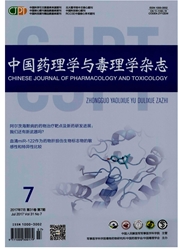

 中文摘要:
中文摘要:
目的: N-methyl-D-aspartic 酸(NMDA ) 受体调节的人作为潜在的抗抑郁剂代理人显示出有希望的结果,而 timosaponins 从中国植物根茎 Anemarrhenae 提取了,展出抗抑郁剂活动。在现在的学习,我们检验了是否 YY-23, timosaponin B-III 的修改代谢物,能在老鼠影响 NMDA 受体在 vitro 的海马趾的神经原,并且在强调 mice.Methods 评估了它的像抗抑郁剂的效果:导致 NMDA 的水流在尖锐地分裂的老鼠被记录用一种整个房间的记录技术的海马趾的 CA1 神经原。C57BL/6 老鼠暴露于一个 6 星期的长期的温和压力(厘米) 或 10-d 长期的社会失败应力(CSDS ) 。强调老鼠与 YY-23 被对待(20 mg·; kg −1·d−1) 或积极控制的药, fluoxetine (10 mg·;为 3 个星期的 kg −1·d−1) 。行为的评价被执行每 week.Results : 在尖锐地分裂的老鼠海马趾的 CA1 神经原, YY-23 有选择地并且 reversibly 与 2.8 μ 的 EC 50 价值禁止了导致 NMDA 的水流; mol/L。由 YY-23 的导致 NMDA 的水流的这抑制是非竞争的,并且没有电压相关性或使用相关性的特征。有 YY-23 的强调老鼠的处理蔗糖偏爱和不动时间的不仅颠倒的导致厘米的缺乏,和社会相互作用的 导致CSDS 的减小,而且作为与 fluoxetine.Conclusion 相比有更快的发作: YY-23 是有在厘米和 CSDS 消沉的老鼠模型的有希望的快速的像抗抑郁剂的效果的 NMDA 受体的一个新奇非竞争的对手。
 英文摘要:
英文摘要:
Aim: N-methyI-D-aspartic acid (NMDA) receptor modulators have shown promising results as potential antidepressant agents, whereas timosaponins extracted from the Chinese herb Rhizoma Anemarrhenae exhibit antidepressant activities. In the present study we examined whether YY-23, a modified metabolite of timosaponin B-Ⅲ, could affect NMDA receptors in rat hippocampal neurons in vitro, and evaluated its antidepressant-like effects in stressed mice. Methods: NMDA-induced currents were recorded in acutely dissociated rat hippocampal CA1 neurons using a whole-cell recording technique. C57BL/6 mice were exposed to a 6-week chronic mild stress (CMS) or a 10-d chronic social defeat stress (CSDS). The stressed mice were treated with YY-23 (20 mg.kg-1.d-1) or a positive-control drug, fluoxetine (10 mg.kg-l.d-1) for 3 weeks. Behavioral assessments were carried out every week. Results: In acutely dissociated rat hippocampal CA1 neurons, YY-23 selectively and reversibly inhibited NMDA-induced currents with an EC50 value of 2.8 pmol/L. This inhibition of NMDA-induced currents by YY-23 was non-competitive, and had no features of voltage- dependency or use-dependency. Treatment of the stressed mice with YY-23 not only reversed CMS-induced deficiency of sucrose preference and immobility time, and CSDS-induced reduction of social interaction, but also had faster onset as compared to fluoxetine Conclusion: YY-23 is a novel non-competitive antagonist of NMDA receptors with promising rapid antidepressant-like effects in mouse models of CMS and CSDS depression.
 同期刊论文项目
同期刊论文项目
 同项目期刊论文
同项目期刊论文
 Burst firing patterns in the prefrontal cortex underlying the neuronal mechanisms of depression prob
Burst firing patterns in the prefrontal cortex underlying the neuronal mechanisms of depression prob Timosaponin derivative YY-23 acts as a non-competitive NMDA receptor antagonist and exerts a rapid a
Timosaponin derivative YY-23 acts as a non-competitive NMDA receptor antagonist and exerts a rapid a 期刊信息
期刊信息
